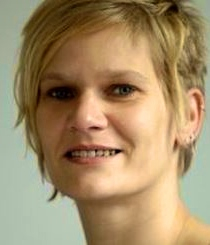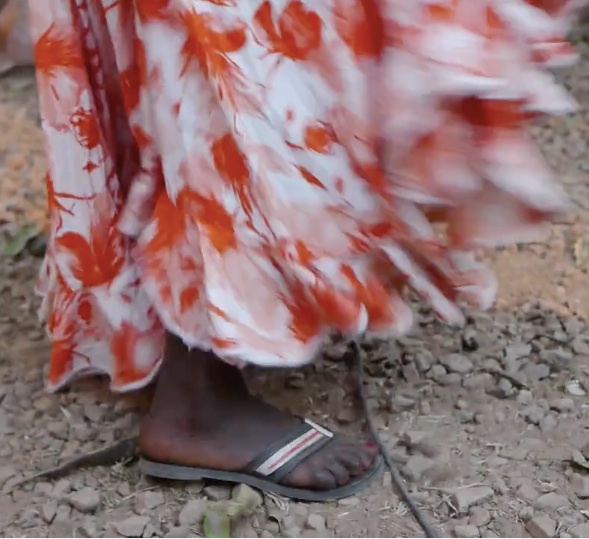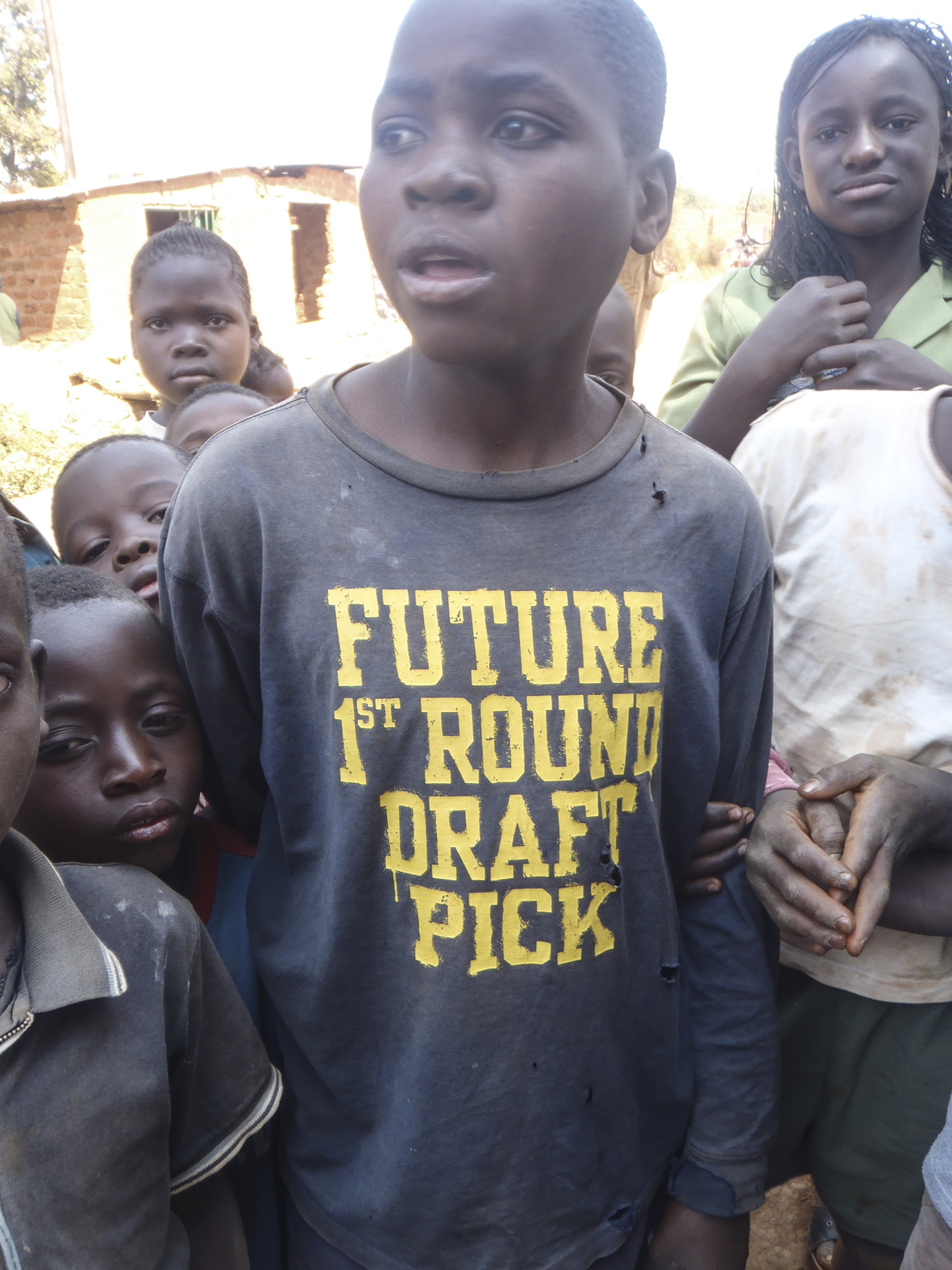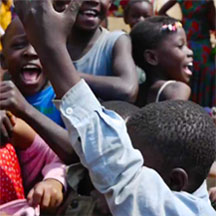In Katanga, LEALA was interlinked with the development education project Maono, in which workshop techniques and practical creative exercises for the participants were used. The live phase in the DRC was spread over two seven week periods in the summer of 2012 and spring 2013 (for a total of 6 days of workshops as well as individual follow up of participants’ work). The online work was conducted via email with four tasks with reading materials and accompanying questions set out for the participants. The participants were young adults from varying higher education courses.
For a PowerPoint presentation of the LEALA pilot in the DRC given at the 2013 WFSF Conference held in Bucharest please click here
The 2013-2014 Project

WFSF Executive Board Member Dr. Maya van Leemput (left) from Belgium coordinated the LEALA in Katanga Pilot. It aims to provide a high standard introduction to futures studies education in this copper-mining province of the Democratic Republic of the Congo (DRC). This pilot benefits young adults, artists, creative professionals and NGO workers based in Lubumbashi. The Katanga pilot invited participants from a North-South exchange project, entitled Maono (Swahili for vision) to participate in LEALA. Agence Future developed Maono in partnership with the Brussels-based University Centre for Development Cooperation (UCOS), with the collaboration of several Lubumbashi organisations, active in cultural and social rights.
Twelve students from Brussels and twelve from Lubumbashi work together in Lubumbashi with six artists to create a collection of futures images. The project has run from 2012 to 2014 with new participants each year (50% young women). The participants use a “Roadbook” created by Agence Future.
Benefits and major results obtained
The Katanga pilot successfully increased futures awareness and knowledge for all three participant groups as intended. Participants have gained skills and insight. Self-reporting by the participants in the local project indicates a changed, more pro-active, futures orientation for many of them. This kind of learning is an important achievement in the difficult circumstances of the DRC (last but one on the UNDP’s human development index ranking).
Our Katangese participants, most in higher education, found the online component of the project a real challenge. During the live workshops, they took in with enthusiasm the theories and ideas introduced to them concerning foresight and futures studies. The motivation of these participants was high despite the fact that none of them had heard of futures studies (or ‘la prospective’) prior to their participation in Maono and LEALA.
 The young participants and artists in Lubumbashi created a diverse collection of images of the futures as intended at the outset of the project. These images constitute an important project result for Maono and have been shown at the universities of Brussels and Lubumbashi.
The young participants and artists in Lubumbashi created a diverse collection of images of the futures as intended at the outset of the project. These images constitute an important project result for Maono and have been shown at the universities of Brussels and Lubumbashi.
The Katanga pilot has provided 11 documents to the online resources. Video-recordings of interviews conducted by participants will be made available for the LEALA video channel from September 2014. The music-clips made with Maono in 2012 and 2013 are already included in the LEALA video-channel.
The pilot coordinator has successfully presented a paper about Maono to the 2014 Future Infinite Conference in Helsinki Finland, organised by the Finland Futures Research Centre. The presentation there emphasised the importance of bringing together different partners and their diverging motivations and competences for futures oriented and development related work. Previously, the LEALA and MAONO blend of the pilot in Katanga was the subject of Van Leemput’s Keynote Address at the 21st WFSF World Futures Conference in Bucharest in 2013 entitled “Global Research and Social Innovation: Transforming Futures.” The Conference was organised by the WFSF and hosted by the Executive Agency for Higher Education, Research, Development and Innovation Funding (UEFISCDI) at the Bucharest Academy of Economic Studies (ASE). This presentation treated the on-the-ground and organisational realities of the project in Katanga. Here too the emphasis was on approaches for overcoming the challenges of partnerships between different types of organisations from both the North and the South with varying areas of activity.
 The experience of this pilot provided important learning concerning real world approaches to online education in the least developed regions of the Global South, particularly in Africa.
The experience of this pilot provided important learning concerning real world approaches to online education in the least developed regions of the Global South, particularly in Africa.
In 2012 we already aimed to establish online correspondence with LEALA participants and local moderators. We provided two local organisations that accompany the participants with Youbridge laptops for this purpose. It soon became clear however that most online communication would be Facebook based, not even email or googledocs. With certain mobile phone service providers, Facebook affords free Internet access on smart phones to its users and this has immediate effects on participants’ connectivity. Following this insight, we undertook to use the live workshops period of 2013 to provide all selected LEALA participants with a library card for the French Institute’s Halle de l’Etoile. The mediateque there has a WiFi connection and Youbridge made a new laptop for priority use by LEALA participants available. Only a third of the participants used this facility at all, others used it intensively, including for educational or research purposes outside of LEALA. The online tasks were set up as email correspondence with attached texts and materials to download. We accompanied this with irregular Facebook chats with a handful of participants.
The workbook, the project results presentation of Maono, and the French language reading materials, bibliographies and web resources used for this pilot are included in the new LEALA online educational resources repository soma. A collection of printed reading materials (French media) has been built and shared with participants and partner organisations on the ground.
The new digital learning platform of distributed channels that is now in place will allow us to attempt a new mode of communication with the LEALA participants who are all still being followed up and will continue activities until at least November 2014. We are beginning to overcome technical challenges through cooperation with local organisations who provide Internet access to the participants. It has to be recognised that this kind of detailed local structuring of even logistical aspects of blended learning, is a crucial component of the organisation of local educational activities. All future course organisers will have to give this point consideration from the outset and have access to (local) knowledge in this area.
The report and materials produced from the Katanga LEALA pilot will be an invaluable resource for others seeking to undertake educational work in such communities.

